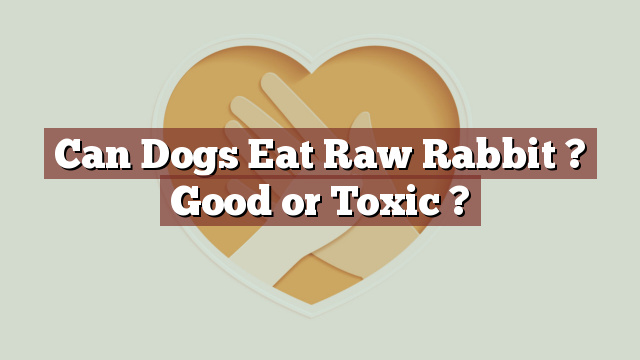Can Dogs Eat Raw Rabbit? Good or Toxic?
Knowing which foods are safe for our pets is crucial in ensuring their health and well-being. As responsible pet owners, it is important to be informed about the potential risks and benefits of various foods that we might consider feeding our dogs. This article will specifically address the topic of whether dogs can eat raw rabbit and whether it is good or toxic for them.
Nutritional Value of Raw Rabbit for Dogs
Rabbits are a rich source of essential nutrients for dogs. They are high in protein, which is vital for muscle development and repair. Additionally, rabbit meat contains important vitamins and minerals such as vitamin B12, iron, and zinc. These nutrients contribute to a healthy immune system, proper neurological function, and overall vitality in dogs.
Is Raw Rabbit Safe or Toxic for Dogs?
Yes, dogs can safely eat raw rabbit. Dogs are natural carnivores and have a digestive system that is well-suited for consuming raw meat. In fact, many dog owners choose to feed their pets a raw food diet, which includes raw meat, as it is believed to mimic the diet of their ancestors in the wild.
However, it is important to note that not all dogs may tolerate raw rabbit meat equally. Some dogs may have sensitivities or allergies to certain proteins, including rabbit. Therefore, it is always recommended to introduce any new food gradually and monitor your dog’s reaction.
Potential Risks and Benefits of Feeding Dogs Raw Rabbit
Feeding dogs raw rabbit can have several potential benefits. As mentioned earlier, it is a great source of protein and essential nutrients. Additionally, the raw meat may contain enzymes and beneficial bacteria that can promote healthy digestion and improve nutrient absorption in dogs.
However, there are also some risks associated with feeding raw rabbit to dogs. One of the main concerns is the potential for bacterial contamination, such as Salmonella or E. coli. These bacteria can pose a health risk not only to the dog but also to humans who come into contact with the raw meat. Therefore, it is crucial to handle raw rabbit with proper hygiene and food safety precautions.
What to Do If Your Dog Eats Raw Rabbit
If your dog accidentally consumes raw rabbit, it is important to assess the situation and take appropriate action. If your dog is exhibiting any unusual symptoms such as vomiting, diarrhea, or lethargy, it is recommended to contact your veterinarian immediately. They will be able to provide guidance on whether further medical attention is required. Similarly, if you suspect bacterial contamination, it is advisable to consult your vet for appropriate testing and treatment.
Conclusion: Feeding Raw Rabbit to Dogs
In conclusion, dogs can safely eat raw rabbit as part of a balanced diet. It is a nutrient-rich source of protein, vitamins, and minerals that can contribute to their overall health. However, it is essential to introduce any new food gradually and monitor your dog’s reaction. Additionally, practicing proper food safety measures and maintaining good hygiene when handling raw rabbit is crucial to minimize the risk of bacterial contamination. As always, if you have any concerns or questions, consult with your veterinarian for personalized advice and guidance.
Thank you for investing your time in exploring [page_title] on Can-Eat.org. Our goal is to provide readers like you with thorough and reliable information about various dietary topics. Each article, including [page_title], stems from diligent research and a passion for understanding the nuances of our food choices. We believe that knowledge is a vital step towards making informed and healthy decisions. However, while "[page_title]" sheds light on its specific topic, it's crucial to remember that everyone's body reacts differently to foods and dietary changes. What might be beneficial for one person could have different effects on another. Before you consider integrating suggestions or insights from "[page_title]" into your diet, it's always wise to consult with a nutritionist or healthcare professional. Their specialized knowledge ensures that you're making choices best suited to your individual health needs. As you navigate [page_title], be mindful of potential allergies, intolerances, or unique dietary requirements you may have. No singular article can capture the vast diversity of human health, and individualized guidance is invaluable. The content provided in [page_title] serves as a general guide. It is not, by any means, a substitute for personalized medical or nutritional advice. Your health should always be the top priority, and professional guidance is the best path forward. In your journey towards a balanced and nutritious lifestyle, we hope that [page_title] serves as a helpful stepping stone. Remember, informed decisions lead to healthier outcomes. Thank you for trusting Can-Eat.org. Continue exploring, learning, and prioritizing your health. Cheers to a well-informed and healthier future!

